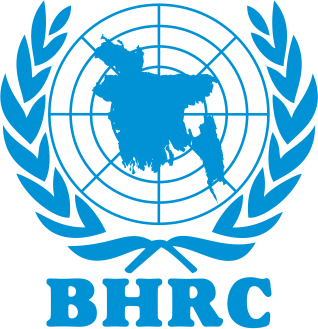

United Nations
OHCHR/ECOSOC Affiliation Letter

António Guterres,,
Portogul
Secretary-General of the United Nations
since 1 January 2017, Present
UN OHCHR
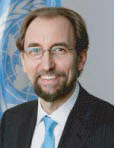
Zeid Ra'ad Al Hussein
High Commissioner for Human Rights, Geneva
Country JORDAN, 2014-present
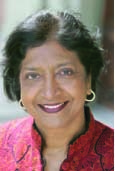
Navanethem Pillay
High Commissioner for Human Rights, Geneva
Country: SOUTH AFRICA, Period : 2008-2014
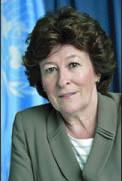
Louise Arbour
High Commissioner for Human Rights, Geneva
Country CANADA, Period: 2004-2008
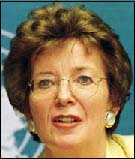
Mary Robinson
High Commissioner for Human Rights, Geneva
Country : IRELAND(UK), Period: 1997-2002
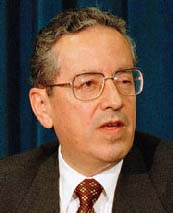
José Ayala-Lasso
High Commissioner for Human Rights, Geneva
Country : ECUADOR, Period: 1994-1997
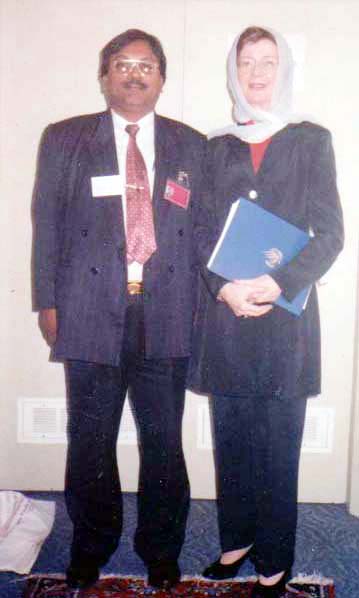
Asian Preparatory Meeting for the WCAR Tehran, Iran 19th February 2001
Ms. Mary Robinson UN High Commissioner for Human Rights, Geneva and Md. Saiful Islam Dildar
Secretary General of Bangladesh Human Rights Commission-BHRC, Organized by : United Nations.
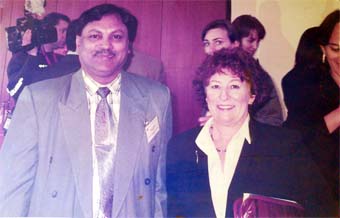
UN High Commissioner of Human Rights Geneva Ms. Louise Arbour and Secretary General of Bangladesh Human Rights Commission-BHRC Dr. Saiful I. Dildar in Berlin Meeting of ICJ at noon of 27th August 2004 in Berlin, German.
.jpg)
On the participation of 23rd International Coordinating Committee-ICC General Meeting of United Nations for Human Rights in Geneva, Switzerland dated on the 23rd March 2010 in the picture (from left) Ms. Navy Pillay, Secretary General of UN High Commissioner for Human Rights, Dr. Saiful I. Dildar, Secretary General of Bangladesh Human Rights Commission-BHRC
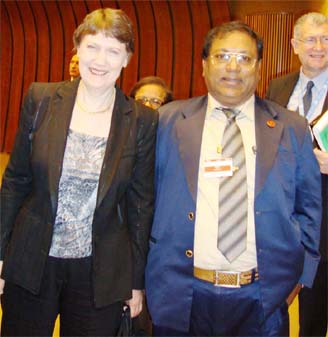
On the participation of 23rd International Coordinating Committee-ICC General Meeting of United Nations for Human Rights in Geneva, Switzerland dated on the 23rd March 2010 in the picture (from left) Ms. Helen Clark, UNDP Administrator and former President of New Zealand and Dr. Saiful I. Dildar, Secretary General of Bangladesh Human Rights Commission-BHRC.
.jpg)
On the participation of 23rd ICC General Meeting of United Nations for Human Rights in Geneva, Switzerland dated on the 23rd March 2010 in the picture (from left) Dr. Saiful I. Dildar, Secretary General of Bangladesh Human Rights Commission-BHRC, ICC Chairperson Ms. J. Lynch
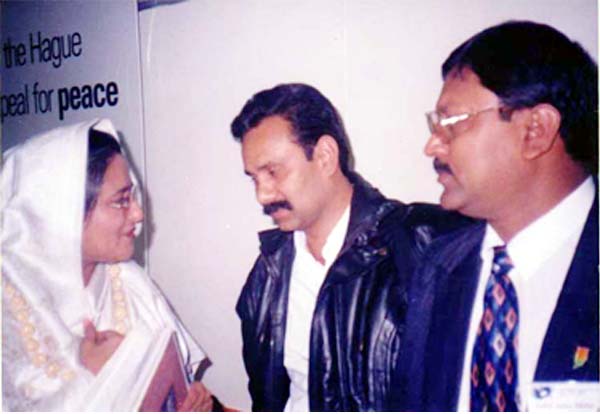
Hague World Peace Conference on 11 May 1999 in Hague, Netherlands met with Bangladesh Prime Minister Sheikh Hasina and Secretary General of Bangladesh Human Rights Commission-BHRC Dr. Saiful I. Dildar (from right) Organized by : United Nations.
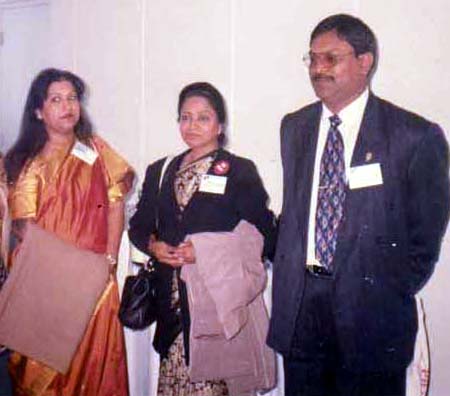
Hague World Peace Conference on 11 May 1999 in Hague, Netherlands met with Bangabandhu daughter Sheikh Rehana, Barrister Rabeya Bhuiyan (Middle) and Secretary General of Bangladesh Human Rights Commission-BHRC Dr. Saiful I. Dildar (from right), Organized by : United Nations.
United Nations Universal Declaration of Human Rights
Adopted and proclaimed by General Assembly resolution 217 A (III) of 10 December 1948
On December 10, 1948 the General Assembly of the United Nations adopted and proclaimed the Universal Declaration of Human Rights the full text of which appears in the following pages. Following this historic act the Assembly called upon all Member countries to publicize the text of the Declaration and "to cause it to be disseminated, displayed, read and expounded principally in schools and other educational institutions, without distinction based on the political status of countries or territories."
PREAMBLE
Whereas recognition of the inherent dignity and of the equal and inalienable rights of all members of the human family is the foundation of freedom, justice and peace in the world,
Whereas disregard and contempt for human rights have resulted in barbarous acts which have outraged the conscience of mankind, and the advent of a world in which human beings shall enjoy freedom of speech and belief and freedom from fear and want has been proclaimed as the highest aspiration of the common people,
Whereas it is essential, if man is not to be compelled to have recourse, as a last resort, to rebellion against tyranny and oppression, that human rights should be protected by the rule of law,
Whereas it is essential to promote the development of friendly relations between nations,
Whereas the peoples of the United Nations have in the Charter reaffirmed their faith in fundamental human rights, in the dignity and worth of the human person and in the equal rights of men and women and have determined to promote social progress and better standards of life in larger freedom,
Whereas Member States have pledged themselves to achieve, in co-operation with the United Nations, the promotion of universal respect for and observance of human rights and fundamental freedoms,
Whereas a common understanding of these rights and freedoms is of the greatest importance for the full realization of this pledge,
Now, Therefore THE GENERAL ASSEMBLY proclaims THIS UNIVERSAL DECLARATION OF HUMAN RIGHTS as a common standard of achievement for all peoples and all nations, to the end that every individual and every organ of society, keeping this Declaration constantly in mind, shall strive by teaching and education to promote respect for these rights and freedoms and by progressive measures, national and international, to secure their universal and effective recognition and observance, both among the peoples of Member States themselves and among the peoples of territories under their jurisdiction.
Article-1
All human beings are born free and equal in dignity and rights. They are endowed with reason and conscience and should act towards one another in a spirit of brotherhood.
Article 2
Everyone is entitled to all the rights and freedoms set forth in this Declaration, without distinction of any kind, such as race, colour, sex, language, religion, political or other opinion, national or social origin, property, birth or other status.
Furthermore, no distinction shall be made on the basis of the political, jurisdictional or international status of the country or territory to which a person belongs, whether it be independent, trust, non-self-governing or under any other limitation of sovereignty.
Article 3
Everyone has the right to life, liberty and security of person.
Article 4
No one shall be held in slavery or servitude; slavery and the slave trade shall be prohibited in all their forms.
Article 5
No one shall be subjected to torture or to cruel, inhuman or degrading treatment or punishment.
Article 6
Everyone has right to recognition everywhere as a person before the law.
Article 7
All are equal before the law and are entitled without any discrimination to equal protection of the law. All are entitled to equal protection against any discrimination in violation of this Declaration and against any incitement to such discrimination.
Article 8
Everyone has the right to an effective remedy by the competent national tribunals for acts violating the fundamental rights granted him by the constitution or by law.
Article 9
No one shall be subjected to arbitrary arrest, detention or exile.
Everyone is entitled in full equality to a fair and public hearing by an independent and impartial tribunal, in the determination of his rights and obligations and of any criminal charge against him.
Article 10
Everyone is entitled in full equality to a fair and public hearing by an independent and impartial tribunal, in the determination of his rights and obligations and of any criminal charge against him.
Article 11
1. Everyone charged with a penal offence has the right to be presumed innocent until proved guilty according to law in a public trial at which he has had all the guarantees necessary for his defence.
2. No one shall be held guilty of any penal offence on account of any act or omission which did not constitute a penal offence, under national or international law, at the time when it was committed. Nor shall a heavier penalty be imposed than the one that was applicable at the time the penal offence was committed.
Article 12
No one shall be subjected to arbitrary interference with his privacy, family, home or correspondence, nor to attacks upon his honour and reputation. Everyone has the right to the protection of the law against such interference or attacks.
Article 13
1. Everyone has the right to freedom of movement and residence within the borders of each State.
2. Everyone has the right to leave any country, including his own, and to return to his country.
Article 14
1. Everyone has the right to seek and to enjoy in other countries asylum from persecution.
2. This right may not be invoked in the case of prosecutions genuinely arising from non-political crimes or from acts contrary to the purposes and principles of the United Nations.
Article 15
1. Everyone has the right to a nationally.
2. No one shall be arbitrarily deprived of his nationality nor denied the right to change his nationality.
Article 16
1. Men and women of full age, without any limitation due to race, nationality or religion, have the right to marry and to found a family. They are entitled to equal rights as to marriage, during marriage and at its dissolution.
2. Marriage shall be entered into only with the free and full consent of the intending spouses.
3. The family is the natural and fundamental group unit of society and is entitled to protection by society and the State.
Article 17
1. Everyone has the right to own property alone as well as in association with others.
2. No one shall be arbitrarily deprived of his property.
Article 18
Everyone has the right to freedom of thought, conscience and religion; this right includes freedom to change his religion or belief, and freedom, either alone or in community with others and in public or private, to manifest his religion or belief in teaching, practice, worship and observance.
Article 19
Everyone has the right to freedom of opinion and expression; this right includes freedom to hold opinions without interference and to seek, receive and impart information and ideas through any media and regardless of frontiers.
Article 20
1. Everyone has the right to freedom of peaceful assembly and association.
2. No one may be compelled to belong to an association.
Article 21
1. Everyone has the right to take part in the government of his country, directly or through freely chosen representatives.
2. Everyone has the right of equal access to public service in his country.
3. The will of the people shall be the basis of the authority of government; this will shall be expressed in periodic and genuine elections which shall be by universal and equal suffrage and shall be held by secret vote or by equivalent free voting procedures.
Article 22
Everyone, as a member of society, has the right to social security and is entitled to realization, through national effort and international cooperation and in accordance with the organization and resources of each State, of the economic, social and cultural rights indispensable for his dignity and the free development of his personality.
Article 23
1. Everyone has the right to work, to free choice of employment, to just and favourable conditions of work and to protection against unemployment.
2. Everyone, without any discrimination, has the right to equal pay for equal work.
3. Everyone who works has the right to just and favourable remuneration ensuring for himself and his family and existence worthy of human dignity, and supplemented, if necessary, by other means of social protection.
4. Everyone has the right to form ad to join trade unions for the protection.
Article 24
Everyone has the right to rest and leisure, including reasonable limitation of working hours and periodic holidays with pay.
Article 25
1. Everyone has the right to a standard of living adequate for the health and well-being of himself and of his family, including food, clothing, housing and medical care and necessary social services, and the right to security in the event of unemployment, sickness, disability, widowhood, old age or other lack of livelihood in circumstances beyond his control.
2. Motherhood and childhood are entitled to special care and assistance. All children whether born in or out of wedlock, shall enjoy the same social protection.
Article 26
1. Everyone has the right to education. Education shall be free, at least in the elementary and fundamental stages. Elementary education shall be compulsory. Technical and professional education shall be made generally available and higher education shall be equally accessible to all on the basis of merit.
2. Education shall be directed to the full development of the human personality and to the strengthening of respect for human rights and fundamental freedoms. It shall promote understanding, tolerance and friendship among all nations, racial or religious groups and shall further the activities of the United Nations for the maintenance of peace.
3. Parents have a prior right to choose the kind of education that shall be given to their children.
Article 27
1. Everyone has the right freely to participate in the cultural life of the community, to enjoy the arts and to share in scientific advancement and its benefits.
2. Everyone has the right to the protection of the moral and material interests resulting from any scientific, literary or artistic production of which he is the author.
Article 28
Everyone is entitled to a social and international order in which the rights and freedoms set forth in this Declaration can be fully realized.
Article 29
1. Everyone has duties to the community in which alone the free and full development of his personality is possible.
2. In the exercise of his rights and freedoms, everyone shall be subject only to such limitations as are determined by law solely for the purpose of securing due recognition and respect for the rights and freedoms of others and of meeting the just requirements of morality, public order and the general welfare in a democratic society.
3. These rights and freedoms may in no case be exercised contrary to the purposes and principles of the United Nations.
Article 30
Nothing in this Declaration may be interpreted as implying for any State, group or person any right to engage in any activity or to perform any act aimed at the destruction of any of the rights and freedoms set forth herein.
মানবাধিকারের সার্বজনীন ঘোষণাপত্রের ত্রিশটি ধারা
মানবাধিকারের সার্বজনীন ঘোষণাপত্রের ত্রিশটি ধারা
ধারা-১ বন্ধনহীন অবস্থায় এবং সম-মর্যাদা ও অধিকারাদি নিয়ে সকল মানুষই জন্মগ্রহণ করে। বুদ্ধি ও বিবেক তাদের অর্পণ করা হয়েছে এবং ভ্রাতৃত্বসুলভ মনোভাব নিয়ে তাদের একে অন্যের প্রতি আচরণ করা উচিত।
ধারা-২ যে কোন প্রকার পার্থক্য যথা- জাতি, গোত্র, বর্ণ, নারী-পুরুষ, ভাষা, ধর্ম, রাজনৈতিক বা অন্য মতবাদ, জাতীয় বা সামাজিক উৎপত্তি, সম্পত্তি, জন্ম বা অন্য মর্যাদা নির্বিশেষে প্রত্যেকেই ঘোষণাপত্রের উল্লিখিত সকল অধিকার ও স্বাধিকারে স্বত্ববান। অধিকন্তু, কোন ব্যক্তি যে দেশ বা অঞ্চলের অধিবাসী, তা স্বাধীন, অছিভূক্ত এলাকা, অস্বায়ত্তশাসিত অথবা অন্য যে কোন প্রকার সীমিত সার্বভৌমত্বের মধ্যে থাকুক না কেন, তার রাজনৈতিক, সীমানাগত ও আন্তর্জাতিক মর্যাদার ভিত্তিতে কোন পার্থক্য করা চলবে না।
ধারা-৩ প্রত্যেকেরই জীবন ধারণ, স্বাধীনতা ও ব্যক্তি নিরাপত্তার অধিকার রয়েছে।
ধারা-৪ কাউকে দাস হিসেবে বা দাসত্বে রাখা চলবে না; সকল প্রকার দাস-প্রথা ও দাস-ব্যবসা নিষিদ্ধ থাকবে।
ধারা-৫ কাউকে নির্যাতন অথবা নিষ্ঠুর, অমানুষিক অথবা অবমাননাকর আচরণ অথবা শাস্তি ভোগে বাধ্য করা চলবে না।
ধারা-৬ আইনের সমক্ষে প্রত্যেকেরই সর্বত্র ব্যক্তি হিসেবে স্বীকৃতিলাভের অধিকার রয়েছে।
ধারা-৭ আইনের কাছে সকলেই সমান এবং কোনরূপ বৈষম্য ব্যতিরেকে সকলেরই আইনের দ্বারা সমভাবে রক্ষিত হওয়ার অধিকার রয়েছে। এই ঘোষণাপত্র লঙ্ঘনকারী কোনরূপ বৈষম্য বা এই ধরনের বৈষম্যের কোন উস্কানির বিরুদ্ধে সমভাবে রক্ষিত হওয়ার অধিকার সকলেরই আছে।
ধারা-৮ যে কার্যাদির ফলে শাসনন্ত বা আইন কর্তৃক প্রদত্ত মৌল অধিকারসমূহ লঙ্ঘিত হয় সে সবের জন্য উপযুক্ত জাতীয় বিচার আদালতের মারফত কার্যকর প্রতিকার লাভের অধিকার প্রত্যেকেরই রয়েছে।
ধারা-৯ কাউকে খেয়ালখুশিমত গ্রেফতার, আটক অথবা নির্বাসন করা যাবে না।
ধারা-১০ প্রত্যেকেরই তার অধিকার ও দায়িত্বসমূহ এবং তার বিরুদ্ধে আনীত যে কোন ফৌজদারি অভিযোগ নিরূপণের জন্য পূর্ণ সমতার ভিত্তিতে একটি স্বাধীন ও নিরপেক্ষ বিচার-আদালতে ন্যায্যভাবে প্রকাশ্যে শুনানি লাভের অধিকার রয়েছে।
ধারা-১১ (ক) যে কেউ কোন দ যোগ্য অপরাধে অভিযুক্ত হলে তার আÍপক্ষ সমর্থনের নিশ্চয়তা দেয়া হয়েছে এমন গণ-আদালত কর্তৃক আইন অনুযায়ী দোষী সাব্যস্ত না হওয়া পর্যন্ত নির্দোষ বলে বিবেচিত হওযার অধিকার রয়েছে। (খ) কাউকেই কোন কাজ বা ত্র“টির জন্য দ যোগ্য অপরাধে দোষী সাব্যস্ত করা চলবে না যদি সংঘটনকালে তা জাতীয় বা আন্তর্জাতিক আইন অনুযায়ী দ যোগ্য অপরাধ বলে গণ্য না হয়ে থাকে। আবার দ যোগ্য অপরাধ সংঘটনকালে যতটুকু শাস্তি প্রযোজ্য ছিল তার চেয়ে অধিক শাস্তি প্রয়োগ চলবে না।
ধারা-১২ কাউকে তার ব্যক্তিগত গোপনীয়তা, পরিবার, বসতবাড়ি বা চিঠিপত্রের ব্যাপারে খেয়ালখুশিমত হস্তক্ষেপ অথবা সম্মান ও সুনামের উপর আক্রমণ করা চলবে না।
ধারা-১৩ (ক) প্রক্যেক রাষ্ট্রের সীমানার মধ্যে চলাচল ও বসতি স্থাপনের অধিকার প্রত্যেকেরই রয়েছে। (খ) প্রত্যেকেরই নিজ দেশসহ যে কোন দেশ ছেড়ে যাওয়ার ও স্বদেশে প্রত্যাবর্তনের অধিকার রয়েছে।
ধারা-১৪ (ক) নির্যাতন এড়ানোর জন্য প্রত্যেকেরই অপর দেশসমূহে আশ্রয় প্রার্থনা ও ভোগ করার অধিকার রয়েছে। (খ) অরাজনৈতিক অপরাধসমূহ অথবা জাতিসংঘের উদ্দেশ্য ও মূলনীতি বিরোধী কার্যকলাপ থেকে সত্যিকারভাবে উদ্ভুত নির্যাতনের ক্ষেত্রে এই অধিকার প্রার্থনা করা নাও যেতে পারে।
ধারা-১৫ (ক) প্রত্যেকেরই একটি জাতীয়তার অধিকার রয়েছে। (খ) কাউকেই যথেচ্ছাভাবে তার জাতীয়তা থেকে বঞ্চিত করা অথবা তাকে তার জাতীয়তা পরিবর্তনের অধিকার অস্বীকার করা চলবে না।
ধারা-১৬ (ক) পূর্ণ বয়স্ক পুরুষ ও নারীদের জাতিগত, জাতীয়তা অথবা ধর্মের কারণে কোন সীমাবদ্ধতা ব্যতিরেকে বিবাহ করা ও পরিবার গঠনের অধিকার রয়েছে। বিবাহের ব্যাপারে, বিবাহিত অবস্থায় এবং বিবাহ বিচ্ছেদকালে তাদের সম-অধিকার রয়েছে। (খ) কেবল বিবাহ ইচ্ছুক পাত্র-পাত্রীর অবাধ ও পূর্ণ সম্মতির দ্বারা বিবাহ বন্ধনে আবদ্ধ হওয়া যাবে। (গ) পরিবার হচ্ছে সমাজের স্বাভাবিক ও মৌলিক একক গোষ্ঠী; সমাজ ও রাষ্ট্র কর্তৃক সংরক্ষিত হওয়ার অধিকার রয়েছে।
ধারা-১৭ (ক) প্রত্যেকেরই একাকী এবং অপরের সহযোগিতায় সম্পত্তির মালিক হওয়ার অধিকার রয়েছে। (খ) কাউকেই তার সম্পত্তি থেকে খেয়ালখুশিমত বঞ্চিত করা চলবে না।
ধারা-১৮ প্রত্যেকেরই চিন্তা, বিবেক ও ধর্মের স্বাধীনতার অধিকার রয়েছে। নিজ ধর্ম অথবা বিশ্বাস পরিবর্তনের স্বাধীনতা এবং একাই অথবা অপরের সহিত যোগসাজশে ও প্রকাশ্যে বা গোপনে নিজ ধর্ম বা বিশ্বাস শিক্ষাদান, প্রচার, উপাসনা ও পালনের মাধ্যমে প্রকাশ করার স্বাধীনতা এই অধিকারের অন্তর্ভূক্ত।
ধারা-১৯ প্রত্যেকেরই মতামতের ও মতামত প্রকাশের স্বাধীনতা রয়েছে; বিনা হস্তক্ষেপে মতামত পোষণ এবং যে কোন উপায়াদির মাধ্যমে ও রাষ্ট্রীয় সীমানা নির্বিশেষে তথ্য ও মতামত সন্ধান, গ্রহণ ও জ্ঞাত করার স্বাধীনতা এই অধিকারের অন্তর্ভূক্ত।
ধারা-২০ (ক) প্রত্যেকেরই শান্তিপূর্ণভাবে সম্মিলিত হওয়ার অধিকার রয়েছে। (খ) কাউকেই কোন সংঘভুক্ত হতে বাধ্য করা যাবে না।
ধারা-২১ (ক) প্রত্যক্ষভাবে অথবা অবাধে নির্বাচিত প্রতিনিধিদের মাধ্যমে নিজ দেশের সরকারে অংশগ্রহণের অধিকার প্রত্যেকেরই রয়েছে। (খ) প্রত্যেকেরই নিজ দেশের সরকারি চাকুরিতে সমান সুযোগ লাভের অধিকার রয়েছে। (গ) জনগণের ইচ্ছাই সরকারের ক্ষমতার ভিত্তি হবে; এই ইচ্ছা সার্বজনীন ও সমান ভোটাধিকারের ভিত্তিতে নৈমিত্তিকভাবে এবং প্রকৃত নির্বাচন দ্বারা ব্যক্ত হবে; গোপন ব্যালট অথবা অনুরূপ অবাধে ভোটদান পদ্ধতিতে এরূপ নির্বাচন অনুষ্ঠিত হবে।
ধারা-২২ সমাজের সদস্য হিসেবে প্রত্যেকেরই সামাজিক নিরাপত্তার অধিকার রয়েছে; প্রত্যেকেই জাতীয় প্রচেষ্টা ও আন্তর্জাতিক সহযোগিতার মাধ্যমে এবং প্রতিটি রাষ্ট্রের সংগঠন ও সম্পদ অনুসারে তার মর্যাদা ও অবাধে ব্যক্তিত্ব বিকাশে অপরিহার্য অর্থনৈতিক, সামাজিক ও সাংস্কৃতিক অধিকার সমূহ আদায় করার জন্য স্বত্ববান।
ধারা-২৩ (ক) প্রত্যেকেরই কাজ করার, অবাধে চাকুরি নির্বাচনের, কাজের জন্য ন্যায্য ও অনুকূল অবস্থা লাভের এবং বেকারত্ব থেকে রক্ষিত হবার অধিকার রয়েছে। (খ) প্রত্যেকেরই কোন বৈষম্য ব্যতিরেকে সমান কাজের জন্য সমান বেতন পাওয়ার অধিকার রয়েছে। (গ) প্রত্যেক কর্মীর তার নিজের ও পরিবারের মানবিক মর্যাদা রক্ষার নিশ্চয়তা দিতে সক্ষম এমন ন্যায্য ও অনুকূল পারিশ্রমিক এবং প্রয়োজনবোধে সেই সঙ্গে সামাজিক সংরক্ষণের জন্য ব্যবস্থাদি সংযোজিত লাভের অধিকার রয়েছে। (ঘ) প্রত্যেকেরই নিজ স্বার্থ রক্ষার্থে শ্রমিক ইউনিয়ন গঠন ও এতে যোগদানের অধিকার রয়েছে।
ধারা-২৪ প্রত্যেকেরই বিশ্রাম ও অবসর বিনোদনের অধিকার রয়েছে। কাজের সময়ের যুক্তিসঙ্গত সীমা ও বেতনসহ নৈমিত্তিক ছুটি এ অধিকারের অন্তর্ভূক্ত।
ধারা-২৫ (ক) নিজের ও নিজ পরিবারের স্বাস্থ্য ও কল্যাণের নিমিত্ত পর্যাপ্ত জীবনমানের অধিকার প্রত্যেকেরই রয়েছে। খাদ্য, বস্ত্র, বাসস্থান, চিকিৎসা ও প্রয়োজনীয় সামাজিক সেবামূলক কার্যাদির সুযোগ এবং বেকারত্ব, পীড়া, অক্ষমতা, বৈধব্য, বার্ধক্য অথবা অনিবার্য কারণে জীবনযাপনে অন্যান্য অপারগতার ক্ষেত্রে নিরাপত্তা এই অধিকারের অন্তর্ভূক্ত। (খ) মাতৃত্ব ও শৈশব অবস্থায় প্রত্যেকে বিশেষ যতœ ও সহায়তা লাভের অধিকারী। বৈবাহিক বন্ধনের ফলে বা বৈবাহিক বন্ধনের বাহিরে জন্ম হোক না কেন, সকল শিশুই অভিন্ন সামাজিক নিরাপত্তা ভোগ করবে।
ধারা-২৬ (ক) প্রত্যেকেরই শিক্ষালাভের অধিকার রয়েছে। অন্ততপক্ষে প্রাথমিক ও মৌলিক পর্যায়ে শিক্ষা অবৈতনিক হবে। প্রাথমিক শিক্ষা বাধ্যতামূলক হবে। কারিগরি ও বৃত্তিমূলক শিক্ষা সাধারণভাবে লভ্য থাকবে এবং উচ্চতর শিক্ষা মেধার ভিত্তিতে সকলের জন্য সমভাবে উন্মুক্ত থাকবে। (খ) ব্যক্তিত্বের পূর্ণ বিকাশ ও মানবিক অধিকার ও মৌলিক স্বাধিকারসমূহের প্রতি শ্রদ্ধাবোধ দৃঢ় করার উদ্দেশ্যে শিক্ষা পরিচালিত হবে। সমঝোতা, সহিষ্ণুতা ও সকল জাতি, বর্ণ ও ধর্মীয় গোষ্ঠীর মধ্যে বন্ধুত্ব উন্নয়ন এবং শান্তি রক্ষার্থে জাতিসংঘের কর্মতৎপরতা বৃদ্ধি করবে। (গ) যে প্রকার শিক্ষা তাদের সন্তানদের দেওয়া হবে তা পূর্ব থেকে বেছে নেয়ার অধিকার পিতামাতার রয়েছে।
ধারা-২৭ (ক) প্রত্যেকেরই গোষ্ঠীগত সাংস্কৃতিক জীবনে অবাধে অংশগ্রহণ, শিল্পকলা চর্চা করা এবং বৈজ্ঞানিক অগ্রগতি ও তার সুফলসমূহের অংশীদার হওয়ার অধিকার রয়েছে। (খ) প্রত্যেকেরই বিজ্ঞান, সাহিত্য অথবা শিল্পকলা-ভিত্তিক সৃজনশীল কাজ থেকে উদ্ভুত নৈতিক ও বৈষয়িক স্বার্থসমূহ রক্ষণের অধিকার রয়েছে।
ধারা-২৮ প্রত্যেকেই এমন একটি সামাজিক ও আন্তর্জাতিক ব্যবস্থার জন্য স্বত্ববান যেখানে এই ঘোষণাপত্রে উল্লিখিত অধিকার ও স্বাধীনতাসমূহ পূর্ণভাবে আদায় করা যেতে পারে।
ধারা-২৯ (ক) প্রত্যেকেরই সমাজের প্রতি কর্তব্যাদি রয়েছে কেবল যার অন্তর্গত হয়েই তার ব্যক্তিত্বের অবাধ ও পূর্ণ বিকাশ সম্ভব। (খ) স্বীয় অধিকার ও স্বাধীনতাসমূহ প্রয়োগকালে প্রত্যেকেরই শুধু ঐ ধরনের সীমাবদ্ধতা থাকবে যা কেবল অপরের অধিকার ও স্বাধীনতাসমূহের যথার্থ স্বীকৃতি ও শ্রদ্ধা নিশ্চিত করা এবং একটি গণতান্ত্রিক সমাজে নৈতিকতা, গণ-শৃঙ্খলা ও সাধারণ কল্যাণের ন্যায্য প্রয়োজনসমূহ মিটানোর উদ্দেশ্যে আইনের দ্বারা নিরূপিত হয়। (গ) এই সকল অধিকার ও স্বাধীনতা ভোগকালে কোন ক্ষেত্রেই জাতিসংঘের উদ্দেশ্য ও মূলনীতি লঙ্ঘন করা চলবে না।
ধারা-৩০ এই ঘোষণায় উল্লিখিত কোন বিষয়কে এরূপভাবে ব্যাখ্যা করা চলবে না যাতে মনে হয় যে এই ঘোষণার অন্তর্ভূক্ত কোন অধিকার বা স্বাধীনতা ক্ষুণœ করার উদ্দেশ্যে কোন রাষ্ট্র, দল বা ব্যক্তি বিশেষের আÍনিয়োগের অধিকার রয়েছে।
gvbevwaKv‡ii mve©Rbxb †NvlYvc‡Îi wÎkwU aviv
aviv-1 eÜbnxb Ae¯’vq
Ges mg-gh©v`v I AwaKvivw` wb‡q mKj gvbylB Rb¥MÖnY K‡i| eyw× I we‡eK Zv‡`i
Ac©Y Kiv n‡q‡Q Ges åvZ…Z¡myjf g‡bvfve wb‡q Zv‡`i G‡K A‡b¨i cÖwZ AvPiY
Kiv DwPZ|
aviv-2 †h †Kvb cÖKvi cv_©K¨ h_v- RvwZ, †MvÎ, eY©, bvix-cyi“l, fvlv, ag©,
ivR‰bwZK ev Ab¨ gZev`, RvZxq ev mvgvwRK DrcwË, m¤úwË, Rb¥ ev Ab¨ gh©v`v
wbwe©‡k‡l cÖ‡Z¨‡KB †NvlYvc‡Îi DwjwLZ mKj AwaKvi I ¯^vwaKv‡i ¯^Z¡evb|
AwaKš‘, †Kvb e¨w³ †h †`k ev A‡ji Awaevmx, Zv ¯^vaxb, AwQf‚³ GjvKv, A¯^vqËkvwmZ
A_ev Ab¨ †h †Kvb cÖKvi mxwgZ mve©‡fŠg‡Z¡i g‡a¨ _vKzK bv †Kb, Zvi ivR‰bwZK,
mxgvbvMZ I Avš—R©vwZK gh©v`vi wfwˇZ †Kvb cv_©K¨ Kiv Pj‡e bv|
aviv-3 cÖ‡Z¨‡KiB Rxeb aviY, ¯^vaxbZv I e¨w³ wbivcËvi AwaKvi i‡q‡Q|
aviv-4 KvD‡K `vm wn‡m‡e ev `vm‡Z¡ ivLv Pj‡e bv; mKj cÖKvi `vm-cÖ_v I `vm-e¨emv
wbwl× _vK‡e|
aviv-5 KvD‡K wbh©vZb A_ev wbôzi, AgvbywlK A_ev AegvbbvKi AvPiY A_ev kvw¯—
†fv‡M eva¨ Kiv Pj‡e bv|
aviv-6 AvB‡bi mg‡¶ cÖ‡Z¨‡KiB me©Î e¨w³ wn‡m‡e ¯^xK…wZjv‡fi AwaKvi i‡q‡Q|
aviv-7 AvB‡bi Kv‡Q mK‡jB mgvb Ges †Kvbiƒc ˆelg¨ e¨wZ‡i‡K mK‡jiB AvB‡bi
Øviv mgfv‡e iw¶Z nIqvi AwaKvi i‡q‡Q| GB †NvlYvcÎ j•NbKvix †Kvbiƒc ˆelg¨
ev GB ai‡bi ˆel‡g¨i †Kvb D¯‹vwbi wei“‡× mgfv‡e iw¶Z nIqvi AwaKvi mK‡jiB
Av‡Q|
aviv-8 †h Kvh©vw`i d‡j kvmbš— ev AvBb KZ©„K cÖ`Ë †gŠj AwaKvimg~n jw•NZ
nq †m m‡ei Rb¨ Dchy³ RvZxq wePvi Av`vj‡Zi gvidZ Kvh©Ki cÖwZKvi jv‡fi
AwaKvi cÖ‡Z¨‡KiB i‡q‡Q|
aviv-9 KvD‡K †LqvjLywkgZ †MÖdZvi, AvUK A_ev wbe©vmb Kiv hv‡e bv|
aviv-10 cÖ‡Z¨‡KiB Zvi AwaKvi I `vwqZ¡mg~n Ges Zvi wei“‡× AvbxZ †h †Kvb †dŠR`vwi
Awf‡hvM wbiƒc‡Yi Rb¨ c~Y© mgZvi wfwˇZ GKwU ¯^vaxb I wbi‡c¶ wePvi-Av`vj‡Z
b¨vh¨fv‡e cÖKv‡k¨ ïbvwb jv‡fi AwaKvi i‡q‡Q|
aviv-11 (K) †h †KD †Kvb ` ‡hvM¨ Aciv‡a Awfhy³ n‡j Zvi AvÍc¶ mg_©‡bi
wbðqZv †`qv n‡q‡Q Ggb MY-Av`vjZ KZ©„K AvBb Abyhvqx †`vlx mve¨¯— bv nIqv
ch©š— wb‡`©vl e‡j we‡ewPZ nIhvi AwaKvi i‡q‡Q| (L) KvD‡KB †Kvb KvR ev
ΓwUi Rb¨ ` ‡hvM¨ Aciv‡a †`vlx mve¨¯— Kiv Pj‡e bv hw` msNUbKv‡j Zv RvZxq
ev Avš—R©vwZK AvBb Abyhvqx ` ‡hvM¨ Aciva e‡j MY¨ bv n‡q _v‡K| Avevi ` ‡hvM¨
Aciva msNUbKv‡j hZUzKz kvw¯— cÖ‡hvR¨ wQj Zvi †P‡q AwaK kvw¯— cÖ‡qvM Pj‡e
bv|
aviv-12 KvD‡K Zvi e¨w³MZ †MvcbxqZv, cwievi, emZevwo ev wPwVc‡Îi e¨vcv‡i
†LqvjLywkgZ n¯—‡¶c A_ev m¤§vb I mybv‡gi Dci AvµgY Kiv Pj‡e bv|
aviv-13 (K) cÖ‡K¨K iv‡óªi mxgvbvi g‡a¨ PjvPj I emwZ ¯’vc‡bi AwaKvi
cÖ‡Z¨‡KiB i‡q‡Q| (L) cÖ‡Z¨‡KiB wbR †`kmn †h †Kvb †`k †Q‡o hvIqvi I
¯^‡`‡k cÖZ¨veZ©‡bi AwaKvi i‡q‡Q|
aviv-14 (K) wbh©vZb Gov‡bvi Rb¨ cÖ‡Z¨‡KiB Aci †`kmg~‡n Avkªq cÖv_©bv I
†fvM Kivi AwaKvi i‡q‡Q| (L) AivR‰bwZK Acivamg~n A_ev RvwZms‡Ni D‡Ïk¨ I
g~jbxwZ we‡ivax Kvh©Kjvc †_‡K mwZ¨Kvifv‡e D™¢zZ wbh©vZ‡bi †¶‡Î GB AwaKvi
cÖv_©bv Kiv bvI †h‡Z cv‡i|
aviv-15 (K) cÖ‡Z¨‡KiB GKwU RvZxqZvi AwaKvi i‡q‡Q| (L) KvD‡KB h‡_”Qvfv‡e
Zvi RvZxqZv †_‡K ewÂZ Kiv A_ev Zv‡K Zvi RvZxqZv cwieZ©‡bi AwaKvi A¯^xKvi
Kiv Pj‡e bv|
aviv-16 (K) c~Y© eq¯‹ cyi“l I bvix‡`i RvwZMZ, RvZxqZv A_ev a‡g©i Kvi‡Y
†Kvb mxgve×Zv e¨wZ‡i‡K weevn Kiv I cwievi MV‡bi AwaKvi i‡q‡Q| weev‡ni
e¨vcv‡i, weevwnZ Ae¯’vq Ges weevn we‡”Q`Kv‡j Zv‡`i mg-AwaKvi i‡q‡Q| (L)
†Kej weevn B”QyK cvÎ-cvÎxi Aeva I c~Y© m¤§wZi Øviv weevn e܇b Ave× nIqv
hv‡e| (M) cwievi n‡”Q mgv‡Ri ¯^vfvweK I †gŠwjK GKK †Mvôx; mgvR I ivóª
KZ©„K msiw¶Z nIqvi AwaKvi i‡q‡Q|
aviv-17 (K) cÖ‡Z¨‡KiB GKvKx Ges Ac‡ii mn‡hvwMZvq m¤úwËi gvwjK nIqvi
AwaKvi i‡q‡Q| (L) KvD‡KB Zvi m¤úwË †_‡K †LqvjLywkgZ ewÂZ Kiv Pj‡e bv|
aviv-18 cÖ‡Z¨‡KiB wPš—v, we‡eK I a‡g©i ¯^vaxbZvi AwaKvi i‡q‡Q| wbR ag©
A_ev wek¦vm cwieZ©‡bi ¯^vaxbZv Ges GKvB A_ev Ac‡ii mwnZ †hvMmvR‡k I
cÖKv‡k¨ ev †Mvc‡b wbR ag© ev wek¦vm wk¶v`vb, cÖPvi, Dcvmbv I cvj‡bi
gva¨‡g cÖKvk Kivi ¯^vaxbZv GB AwaKv‡ii Aš—f©~³|
aviv-19 cÖ‡Z¨‡KiB gZvg‡Zi I gZvgZ cÖKv‡ki ¯^vaxbZv i‡q‡Q; webv n¯—‡¶‡c
gZvgZ †cvlY Ges †h †Kvb Dcvqvw`i gva¨‡g I ivóªxq mxgvbv wbwe©‡k‡l Z_¨ I
gZvgZ mÜvb, MÖnY I ÁvZ Kivi ¯^vaxbZv GB AwaKv‡ii Aš—f‚©³|
aviv-20 (K) cÖ‡Z¨‡KiB kvwš—c~Y©fv‡e mw¤§wjZ nIqvi AwaKvi i‡q‡Q| (L)
KvD‡KB †Kvb msNfz³ n‡Z eva¨ Kiv hv‡e bv|
aviv-21 (K) cÖZ¨¶fv‡e A_ev Aev‡a wbe©vwPZ cÖwZwbwa‡`i gva¨‡g wbR †`‡ki
miKv‡i AskMÖn‡Yi AwaKvi cÖ‡Z¨‡KiB i‡q‡Q| (L) cÖ‡Z¨‡KiB wbR †`‡ki miKvwi
PvKzwi‡Z mgvb my‡hvM jv‡fi AwaKvi i‡q‡Q| (M) RbM‡Yi B”QvB miKv‡ii ¶gZvi
wfwË n‡e; GB B”Qv mve©Rbxb I mgvb †fvUvwaKv‡ii wfwˇZ ˆbwgwËKfv‡e Ges
cÖK…Z wbe©vPb Øviv e¨³ n‡e; †Mvcb e¨vjU A_ev Abyiƒc Aev‡a †fvU`vb c×wZ‡Z
Giƒc wbe©vPb AbywôZ n‡e|
aviv-22 mgv‡Ri m`m¨ wn‡m‡e cÖ‡Z¨‡KiB mvgvwRK wbivcËvi AwaKvi i‡q‡Q;
cÖ‡Z¨‡KB RvZxq cÖ‡Póv I Avš—R©vwZK mn‡hvwMZvi gva¨‡g Ges cÖwZwU iv‡óªi
msMVb I m¤ú` Abymv‡i Zvi gh©v`v I Aev‡a e¨w³Z¡ weKv‡k Acwinvh© A_©‰bwZK,
mvgvwRK I mvs¯‹…wZK AwaKvi mg~n Av`vq Kivi Rb¨ ¯^Z¡evb|
aviv-23 (K) cÖ‡Z¨‡KiB KvR Kivi, Aev‡a PvKzwi wbe©vP‡bi, Kv‡Ri Rb¨ b¨vh¨
I AbyK‚j Ae¯’v jv‡fi Ges †eKviZ¡ †_‡K iw¶Z nevi AwaKvi i‡q‡Q| (L)
cÖ‡Z¨‡KiB †Kvb ˆelg¨ e¨wZ‡i‡K mgvb Kv‡Ri Rb¨ mgvb †eZb cvIqvi AwaKvi
i‡q‡Q| (M) cÖ‡Z¨K Kg©xi Zvi wb‡Ri I cwiev‡ii gvbweK gh©v`v i¶vi wbðqZv
w`‡Z m¶g Ggb b¨vh¨ I AbyK‚j cvwikªwgK Ges cÖ‡qvRb‡ev‡a †mB m‡½ mvgvwRK
msi¶‡Yi Rb¨ e¨e¯’vw` ms‡hvwRZ jv‡fi AwaKvi i‡q‡Q| (N) cÖ‡Z¨‡KiB wbR
¯^v_© i¶v‡_© kªwgK BDwbqb MVb I G‡Z †hvM`v‡bi AwaKvi i‡q‡Q|
aviv-24 cÖ‡Z¨‡KiB wekªvg I Aemi we‡bv`‡bi AwaKvi i‡q‡Q| Kv‡Ri mg‡qi
hyw³m½Z mxgv I †eZbmn ˆbwgwËK QywU G AwaKv‡ii Aš—f©~³|
aviv-25 (K) wb‡Ri I wbR cwiev‡ii ¯^v¯’¨ I Kj¨v‡Yi wbwgË ch©vß Rxebgv‡bi
AwaKvi cÖ‡Z¨‡KiB i‡q‡Q| Lv`¨, e¯¿, evm¯’vb, wPwKrmv I cÖ‡qvRbxq mvgvwRK
†mevg~jK Kvh©vw`i my‡hvM Ges †eKviZ¡, cxov, A¶gZv, ˆeae¨, eva©K¨ A_ev
Awbevh© Kvi‡Y Rxebhvc‡b Ab¨vb¨ AcviMZvi †¶‡Î wbivcËv GB AwaKv‡ii
Aš—f©~³| (L) gvZ…Z¡ I ˆkke Ae¯’vq cÖ‡Z¨‡K we‡kl hZœ I mnvqZv jv‡fi
AwaKvix| ˆeevwnK e܇bi d‡j ev ˆeevwnK e܇bi evwn‡i Rb¥ †nvK bv †Kb, mKj
wkïB Awfbœ mvgvwRK wbivcËv †fvM Ki‡e|
aviv-26 (K) cÖ‡Z¨‡KiB wk¶vjv‡fi AwaKvi i‡q‡Q| Aš—Zc‡¶ cÖv_wgK I †gŠwjK
ch©v‡q wk¶v A‰eZwbK n‡e| cÖv_wgK wk¶v eva¨Zvg~jK n‡e| KvwiMwi I e„wËg~jK
wk¶v mvaviYfv‡e jf¨ _vK‡e Ges D”PZi wk¶v †gavi wfwˇZ mK‡ji Rb¨ mgfv‡e
Db¥y³ _vK‡e| (L) e¨w³‡Z¡i c~Y© weKvk I gvbweK AwaKvi I †gŠwjK
¯^vwaKvimg~‡ni cÖwZ kª×v‡eva `„p Kivi D‡Ï‡k¨ wk¶v cwiPvwjZ n‡e| mg‡SvZv,
mwnòzZv I mKj RvwZ, eY© I ag©xq †Mvôxi g‡a¨ eÜzZ¡ Dbœqb Ges kvwš— i¶v‡_©
RvwZms‡Ni Kg©ZrciZv e„w× Ki‡e| (M) †h cÖKvi wk¶v Zv‡`i mš—vb‡`i †`Iqv
n‡e Zv c~e© †_‡K †e‡Q †bqvi AwaKvi wcZvgvZvi i‡q‡Q|
aviv-27 (K) cÖ‡Z¨‡KiB †MvôxMZ mvs¯‹…wZK Rxe‡b Aev‡a AskMÖnY, wkíKjv PP©v
Kiv Ges ˆeÁvwbK AMÖMwZ I Zvi mydjmg~‡ni Askx`vi nIqvi AwaKvi i‡q‡Q| (L)
cÖ‡Z¨‡KiB weÁvb, mvwnZ¨ A_ev wkíKjv-wfwËK m„Rbkxj KvR †_‡K D™¢zZ ˆbwZK I
ˆelwqK ¯^v_©mg~n i¶‡Yi AwaKvi i‡q‡Q|
aviv-28 cÖ‡Z¨‡KB Ggb GKwU mvgvwRK I Avš—R©vwZK e¨e¯’vi Rb¨ ¯^Z¡evb
†hLv‡b GB †NvlYvc‡Î DwjwLZ AwaKvi I ¯^vaxbZvmg~n c~Y©fv‡e Av`vq Kiv
†h‡Z cv‡i|
aviv-29 (K) cÖ‡Z¨‡KiB mgv‡Ri cÖwZ KZ©e¨vw` i‡q‡Q †Kej hvi Aš—M©Z n‡qB
Zvi e¨w³‡Z¡i Aeva I c~Y© weKvk m¤¢e| (L) ¯^xq AwaKvi I ¯^vaxbZvmg~n
cÖ‡qvMKv‡j cÖ‡Z¨‡KiB ïay H ai‡bi mxgve×Zv _vK‡e hv †Kej Ac‡ii AwaKvi I
¯^vaxbZvmg~‡ni h_v_© ¯^xK…wZ I kª×v wbwðZ Kiv Ges GKwU MYZvwš¿K mgv‡R
ˆbwZKZv, MY-k„•Ljv I mvaviY Kj¨v‡Yi b¨vh¨ cÖ‡qvRbmg~n wgUv‡bvi D‡Ï‡k¨
AvB‡bi Øviv wbiƒwcZ nq| (M) GB mKj AwaKvi I ¯^vaxbZv †fvMKv‡j †Kvb †¶‡ÎB
RvwZms‡Ni D‡Ïk¨ I g~jbxwZ j•Nb Kiv Pj‡e bv|
aviv-30 GB †NvlYvq DwjwLZ †Kvb welq‡K Giƒcfv‡e e¨vL¨v Kiv Pj‡e bv hv‡Z
g‡b nq †h GB †NvlYvi Aš—f©~³ †Kvb AwaKvi ev ¯^vaxbZv ¶zYœ Kivi D‡Ï‡k¨
†Kvb ivóª, `j ev e¨w³ we‡k‡li AvÍwb‡qv‡Mi AwaKvi i‡q‡Q|























